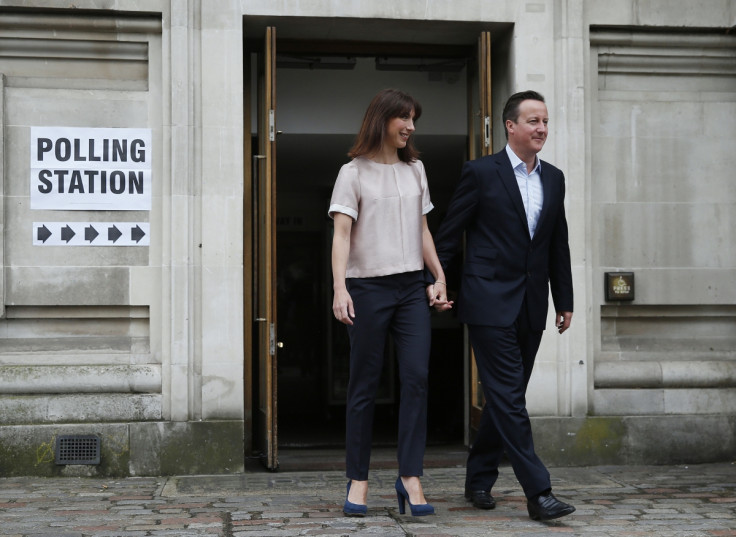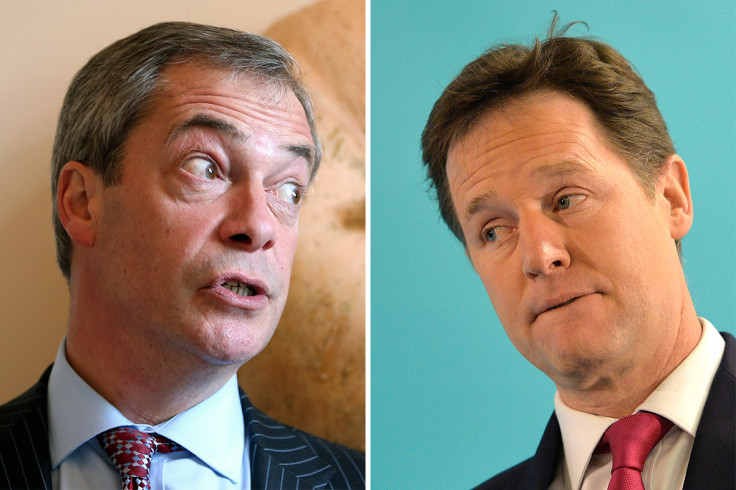David Cameron and Nick Clegg Hit by Party Rebels Ahead of EU Election Results

The full extent of the mainstream political parties' jitters ahead of the European parliament election results has emerged, with demands for the resignation of Liberal Democrat leader Nick Clegg and Tory calls for David Cameron to adopt a far tougher Eurosceptic stance.
The immediate aftermath of the local election results produced a remarkable degree of discipline within Tory and Lib Dem ranks, with little sign of panic in the face of Ukip's extraordinary rise. It was Labour MPs who indulged in what appeared to be pre-planned attacks on both Ed Miliband's style and substance.
But after a poll by Tory peer Lord Ashcroft showing Labour well ahead in core marginal seats, and Ukip continuing to predict first place in the EU election, the discipline broke down and both Clegg and Cameron were battered by significant internal criticisms.
It is likely things will only get worse for the two coalition parties if, as expected, Ukip wins the Euro poll pushing the Tories into third and the Lib Dems into fourth, or even fifth place behind the Greens.
Such a result would be bad news for Labour, which would traditionally be expected to win such a mid-term test of national opinion. A second place would underline Miliband's need to tackle Ukip head on and strengthen the hand of those Labour MPs already attacking his leadership.
But it will be far worse for the Tories, and the latest outbreak of attacks over Cameron's strategy towards the EU will intensify and may even escalate into the sort of internal warfare he has been desperate to avoid.

The Lib Dems, meanwhile, are facing the toughest test with even former leader Paddy Ashdown warning things may well be very bad in the Euro poll, but stressing that removing Clegg a year away from a general election would be suicidal.
The Lib Dem leader, who is facing possible wipeout in the EU poll, suffered the most severe backlash with two Lib Dem parliamentary candidates and around 200 members demanding his resignation to allow a new leader to be in place for the next election.
Winchester candidate Jackie Porter said it was time to act in the party's best interests, West Dorset's Ros Kayes said the public had lost trust in Clegg and MP John Pugh said the leader and his senior team were "in danger of seeming like generals at the Somme".
But the prime minister was also under intense pressure to combat the Ukip threat with a tough new approach to Europe, bringing forward his promised in-out referendum by a year and saying he would lead an "out" campaign if he failed to get proper reforms in his planned treaty re-negotiations.
Former minister David Davis said the Tories' approach towards Europe lacked "both clarity and credibility", and called for the referendum to be promised in 2016 vote to stop "the Ukip resurgence carrying all the way through to the general election".
Meanwhile, a group of moderate Eurosceptic backbenchers called on Cameron to promise to back withdrawal from the EU if he could not get major treaty changes before the planned referendum.
The leader of the Fresh Start group of Tory MPs, Tim Loughton, said Cameron would only be treated seriously by voters if he said he was prepared to lead an "out" campaign.
It also seemed likely Cameron could have another attempt at introducing a referendum bill in the next session of parliament, which starts next month, in a bid to write such a vote into law.
The downside of such a move would be the possibility of a long and bitter parliamentary battle which could dominate the remaining months before the general election. A previous attempt to introduce such a move was defeated in the Lords.
Labour, meanwhile, appeared to be showing some belated discipline with the dissidents who had spoken out in the immediate wake of the local elections being dismissed as "usual suspects" and senior figures, led by deputy leader Harriet Harman highlighting the gains made in the local polls.
All eyes now turn to the results of that European parliament poll and the reaction to them by the political parties, which still appear to be struggling to clarify exactly what they will do, or which policies they might change, to deal with the Farage factor.
© Copyright IBTimes 2025. All rights reserved.






















